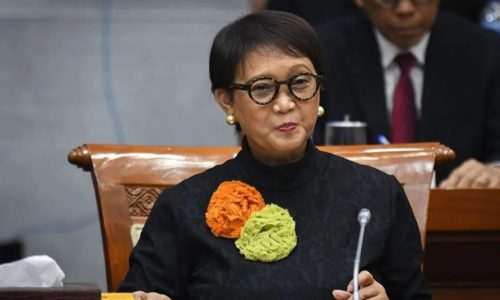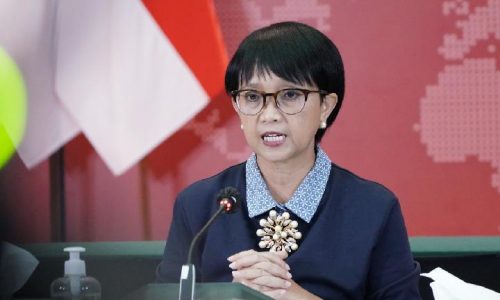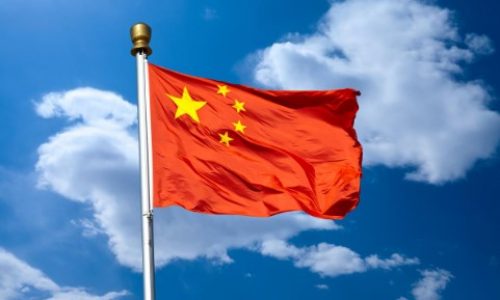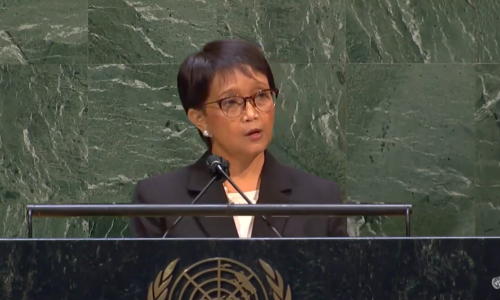Following the trilateral AUKUS defence pact launched by Australia, the US and the UK to counter an assertive China, Indonesia should take a stronger stance in Indo-Pacific.
Connie Rahakundini Bakrie, a defense analyst, stated that AUKUS would influence Indonesia’s foreign policy position in the Indo-Pacific tensions. Indonesia should decide whether to take a non-alignment position or join the US alliance.
”Suppose Indonesia wants to join the US alliance. In that case, it’s okay. Don’t act like now, when I say Indonesia does not join one block, but the defense ministry does buy weapons from all NATO countries,” she told Indonesia Business Post.
The US, the UK and Australia announced a trilateral security pact for the Indo-Pacific region on September 15, 2021. Under the agreement, the US and the UK will assist Australia in acquiring nuclear submarines. The agreement also includes collaboration on cyber and artificial intelligence.
According to Bakrie, AUKUS will strengthen the alliance among the three countries in defense, technology, airspace control and cyberspace. This alliance is more dangerous than QUAD (Quadrennial Security Dialogue) since the latter focuses on maritime and naval issues for the present war, while AUKUS focuses on future warfare.
“Indonesia is surrounded by US allies, including Malaysia, the Philippines, Brunei, Singapore, Australia and Christmas Islands. Christmas Islands is a small territory of Australia located close to Java, and it may become a military base for the US,” she added.
Former Indonesian Air Force Chief of Staff Chappy Hakim also expressed the same view, saying Indonesia’s unclear foreign policy made it not considered as a power in global strategic studies on Indo-Pacific tension.
“Indonesia never decided what its position was in the tension between the US alliance and China,” he said, adding that the Western countries try to persuade Indonesia to be on their side by exaggerating an annual army joint exercise with the US and selling weapons.
In the post-Sukarno era, the founding father of Indonesia, there was no clear position of Indonesia concerning competing world powers. During the Sukarno era, he clearly stated Indonesia’s non-alignment stance while promoting the Non-Alignment Movement and the New Emerging Forces. He also consolidated Asian and African countries to support his third block of countries.
“Therefore, we are not taken into account,” Hakim said.
He saw AUKUS and QUAD as efforts by the West to balance China’s growing influence in the Indo-Pacific region. The presence of both blocs was part of a response by Western powers that their influence is vanishing in the Indo-Pacific due to the increasing power of China. Numerous countries, including US allies such as Australia, the Philippines, Malaysia and Singapore, have economic and trade ties with China.
“They realize that China’s influence is unavoidable and uncontainable. To contain it, they persuaded other countries to establish QUAD, and because QUAD was ineffective, they established AUKUS,” Hakim said.
Afterward, the US sold its nuclear-powered submarine for a low price to Australia to demonstrate its presence in the Indo-Pacific.
“This is a warning for China to refrain from playing with us since we exist (there) and the US remain powerful. But it cannot bring it’s power there, so it gives a nuclear-powered submarine to Australia, create AUKUS and sell the submarine at a low price,” Hakim continued.
According to Indonesia Foreign Minister Retno Marsudi, in response to AUKUS, on September 21, 2021, Indonesia did not wish for an arms race and power projection in the Indo-Pacific region that would threaten the stability of the area.
The foreign ministry Director-General for the Asia Pacific and Africa, Abdul Kadir Jailani, told the Post that during the current tension between the US and China, Indonesia would remain neutral and not align itself with either side.
Belt and Road Initiative
Global Future Institute (GFI) Executive Director and expert in geopolitics Hendrajit said that Indonesia could take advantage of the tension between the US and their allies and China in the Indo-Pacific region through China’s Belt and Road Initiative as a state with a free and active foreign policy.
In his view, the Belt and Road Initiative extends China’s national strategy for the Silk Road Maritime Initiative, economic cooperation based on Chinese investment aid or investment grants for developing countries, including ASEAN nations and Indonesia.
As part of the Belt and Road Initiative, China creates geographical connectivity along the old Silk Road route connecting Xinjiang, China, and Europe. The south track of Southeast Asia encompasses the Malaka Strait and the South China Sea. The countries around the south path of Southeast Asia are targets of China’s nonmilitary cooperation initiatives to counter US influence.
The Belt and Road Initiative has positively impacted economic cooperation, investment and social-cultural diplomacy for Iran, Afghanistan and Pakistan. It has enlivened a history of the Ming Dynasty and the Islamic Dynasties of Abbasiyah that had strong economic and cultural ties in the past. However, in Indonesia, the initiative is only seen as an investment project, with most benefits going to China









